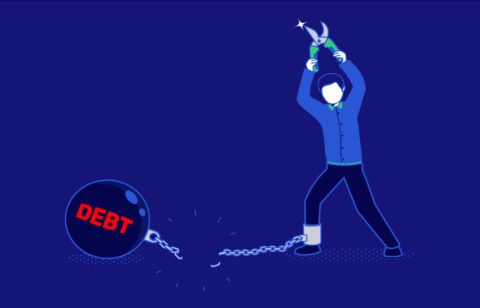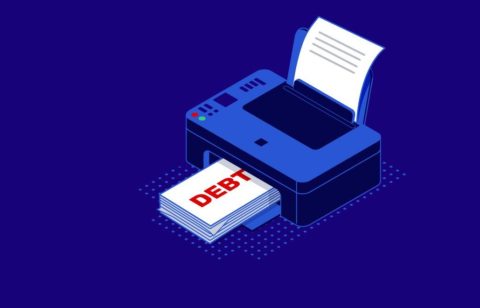Student loans have become a very hot topic even in politics. We read recently that there even being discussed in the Iowa Senate race where one candidate wants to increase the amount of money available in Pell Grants while the other wants to abolish the Department of Education and get the government totally out of the student loan business. It’s even been debated as to whether or not the student loan crisis is really a crisis though one thing is clear – outstanding student loans now total more than $1 trillion. This makes them bigger than even US credit card debt. But regardless of which side of the debate you come down on there are three surprising facts you need to know about student loans and student loan debt.
1. Your Social Security payments can be garnished
Are you aware of the fact that retirement isn’t going to get you out of repaying student loan debts? In fact, it doesn’t matter whether you’re disabled or retired, if you default on a student loan you can have 15% of your checks garnished. And this is an increasingly common problem. In fact, one leading non-profit group worked this year with more than 1000 Americans that had their Social Security payments garnished to repay their student loans. And for retirees any cuts in their social security benefits can really hurt.
Making matters even worse is the fact that these may have been small student loan debts to begin with but have grown much larger over the years because of compounding interest rates. The amounts taken out of these checks aren’t small either. Social Security monthly checks average $1200 and the amount taken out is typically $180. This can have a serious effect on a retiree’s food, shelter and medication.
Most of these loans are parent PLUS loans owed by a sizable number of boomers and others that were forced to retire earlier than they had anticipated because of the economic downturn.
Bankruptcy can’t help
While you can get unsecured debts such as credit card debts and medical debts discharged via a chapter 7 bankruptcy, the same is not true for student loan debts. Congress changed the law a few years ago making it very difficult to get student debts discharged through bankruptcy. This is only possible if you can convince a bankruptcy judge that you have a very serious financial hardship. In addition, most of these loans cannot be refinanced and are locked in at interest rates of 7% or even more – despite the fact that rates have fallen to below 3% in recent years.
If you have outstanding student loans
If you still have student debt you need to make sure the loan or loans don’t go into default. There are a number of repayment options available that would allow you to lower your monthly payments. If you have been impacted by student loans, the first thing you should do is contact your loan servicer to work out a more affordable repayment plan. In the event this doesn’t work, the US Department of Education has an ombudsman you could contact..
2. Student loan debt can affect your credit score – positively
Your credit score is based on five different components in your credit reports. These include payment history, age of credit, debt levels and get diversity. So if you have a well-managed student loan this can actually have a good impact on your credit scores – assuming you handle them correctly.
The Credit Card Accountability Responsibility and Disclosure Act (CARD) of 2009 specified that young people need to prove the financial ability to repay their debts to get a credit card. If you have student loans and manage them correctly this helps establish a credit history, which can help you access revolving credit, which usually means a credit card. If you have credit cards, a student loan can improve the diversity of your credit profiles, which will also help your credit score.
Finding the best deal
Whenever you apply for a new student loan it results in what’s called a hard inquiry, which can ding your credit score by a few points. Do this often enough and you could see your credit score lowered by 10 or even 20 points. However, student loan inquiries are “de-duplicated” on credit reports just as with mortgages and auto loans. This means you can shop for the best deal among private lenders without hurting your credit score. If you haven’t seen how your student loans are impacting your credit, you can get a free copy of your credit reports via www.annualcreditreport.com or individually from each of the three major credit bureaus. You can also get your credit score free from the three credit bureaus or from independent sites such as CreditKarma.com and CreditSesame.com also offer free credit scores.
Make your payments on time
If you make your student loan payments on time this can strengthen your payment history. On the other had, late payments will damage your credit scores. As you might guess, your goal should be to have a sterling credit history and this should provide you with the necessary motivation to avoid making any late payments or, worse yet defaulting on a loan.
The amount you owe doesn’t matter much
This may seem odd but the amount that you owe on student loans has very little of an impact on your credit score. What really matters is your payment history, which is why it’s critical that you take on a manageable amount of debt and then take advantage of loan repayment assistance when available and necessary.
3. You can get student loans forgiven
In the event you have a massive amount of student loan debt it’s possible to get some of it forgiven by doing good. If you volunteer or choose to work in a service-oriented professional job in a lower income community you could see a huge chunk of your federal student loans cancel. In fact, you could knock off thousands and thousands of dollars after just a few years of service. The fact is that programs for loan forgiveness are available to everyone from the Piece Core and America corps volunteers to teachers, nurses, doctors and other young professionals that serve in communities that are in need. You may have to take home lower salaries but you could get some serious help in repaying your student loans.
National Health Service Corps
If you are a nurse practitioner, Dr., dentist, physician assistant, dental hygienist or a mental health professional you could get a big chunk of your educational debt wiped out by choosing to work for two years in an underserved community. In fact, you could get up to $25,000 in student loans repaid each year in exchange for two years of full-time employment. If you choose to serve beyond the two-year contract, you can earn even further loan repayment. And if you are a healthcare professional with really heavy student debt, you could pay down as much as $50,000 in just two years and as much as $85,000 of student loan debt in three years.
Nursing Education Loan Repayment
If you are a registered nurse and agree to work full time (32 hours or more each week) for two years in a non-profit facility that’s in need of nurses, this program repays up to 60% of your student loans. If you choose to work a third-year, you would have the opportunity to repay an extra 25% of your student loans. Just think about this. If you can repay 85% of your student loan debts after just three years, that’s a pretty sweet deal.
Teacher loan forgiveness
When you’re a teacher and make a five-year commitment to teach in a school that’s in need you will get some help with your student loans. However, the best rewards are reserved for those who teach science, math and special education. In fact, if you teach science or math in a low-income high school, you could get as much as $17,500 of your federal Stafford loans canceled. However, again you will need to teach for five years in a designated low-income school.
If you are a special education teacher that works in a designated low-income school for five years you will be eligible for as much as $17,500 in loan forgiveness for your federal Stafford loans. And other teachers who work full time in a designated low-income elementary or high school for five years might be able to get as much as $5000 of your federal Stafford loans canceled.
Public service loan forgiveness
In 2007 Congress passed the College Cost Reduction and Access Act that created a new student loan forgiveness program for public service employees. This program does require something of a commitment as you must work for 10 years as a public service professional. However, the payoff is big – you get all remaining federal direct loans canceled. The public service jobs eligible for this plan include everything from public health and safety to emergency management and from social of law enforcement. To be eligible you will need to have made 10 years of consecutive, on-time repayments of your federal direct loans. This includes Federal direc and then get your remaining loan debt canceled after 10 years of service. So one good strategy would be to consolidate your federal Stafford loans into a new direct consolidation loan and get your remaining loan debt canceled after 10 years of service.
Volunteer program loan forgiveness
If you volunteer for the Peace Corps you can get as much as 70% of your debt canceled after four years of service. If four years seems like too much of a stretch, you could complete a two-year term, which would wipe out 30% of your Perkins loans’ balance. Plus, your payments will be deferred while you are in the Peace Corps. If you volunteer for AmeriCorps you will receive education awards of $4725 for each year you serve. These awards can be used to pay down student loans or for future educational expenses. Even better, some 78 colleges and universities will match AmeriCorps education awards for their students. This means and if you continue your education after you complete your AmeriCorps service, you could see as much as $9450 available to pay your tuition.







